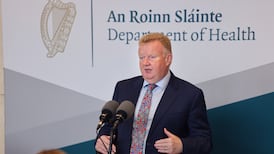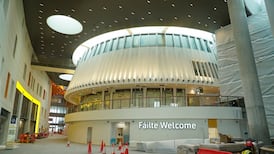The first cases of the South African variant of Covid-19 have been detected in Northern Ireland.
The North's Department of Health said on Tuesday that three cases of the variant had been confirmed in the North.
A detailed health protection risk assessment and contact tracing response has been deployed, the department said, adding that the risk of onward transmission was “judged to be low at this time”.
Under the Covid-19 regulations currently in force, all travellers arriving in the North from abroad must self-isolate for 10 days.
Northern Ireland's Minister for Health Robin Swann said he had previously been clear that a confirmed case of the South African variant was "inevitable at some point" but this did not mean that it would become the most prevalent or the dominant strain in the North.
“However, it does underline once again the very real need for continuing caution in relation to Covid-19.
“The best way to stop variants developing or spreading is to keep pushing down infection rates and transmission of the virus in our community,” he said.
Further deaths
A further five people with Covid-19 have died in the North, its Department of Health announced on Tuesday, bringing the total number of fatalities there from Covid-19 to 2,041. An additional 225 people have tested positive for the virus, the department also confirmed.
Meanwhile, members of the DUP, including Minister for Education Peter Weir and First Minister Arlene Foster, have called for a decision on the reopening of the North's schools to be revisited following the announcement by UK prime minister Boris Johnson that all pupils in England are to return to school on March 8th.
Last week Ministers agreed that the North’s Covid-19 lockdown would be extended until April 1st, with only pupils in P1 to P3 – the first three years of primary school – set to return to school on March 8th.
Strict lockdown restrictions – which include the closure of schools, non-essential retail and most of the hospitality industry – have been in force in Northern Ireland since St Stephen’s Day, with the Executive due to publish its blueprint for exiting lockdown on March 1st.
However, Mr Weir told the BBC on Tuesday that his preferred position had been that all pupils return on March 8th, “which pre-dated anything the prime minister put [forward]”, but the arrangements which were ultimately adopted in the North had been “the furthest step that we could get consensus and agreement on”.
Mr Weir said that in the last week “additional pieces of information” had emerged, which include “reports and evidence . . . of the high levels of efficacy not simply in trials but in practical terms in terms of the vaccine”, as well as comments from England’s chief medical officer “on the extent to which schools are a safe place”.
This, he said, was “simply supplementing the position that myself and the First Minister had outlined effectively a week ago”, and thus could allow for a quicker return to schools.
‘Significant risk’
However, both Mr Swann and the North’s chief medical officer Dr Michael McBride said on Tuesday that the advice had not changed. “I have not provided further advice to the Executive in the last number of days,” Dr McBride told reporters at a briefing on Tuesday.
“We all want children back to school, children need to be back in school and my advice is that we just do that cautiously and carefully,” he said.
Dr McBride warned that there was a “significant risk at this point in time if we move back from the current restrictions too quickly or too rapidly that we will see a resurgence in cases and that could result in a further wave of infection which could be even greater than the numbers we saw back in January”.
For this reason, he said, it was “very important that the decisions by the Executive in terms of returning to a degree of normality are carefully taken, informed by all of the evidence and one step at a time”.
Sinn Féin MLA Pat Sheehan meanwhile accused the First Minister of making policy "on the hoof" in television interviews, telling the BBC that "the only thing that has changed is that Boris Johnson has decided to make a decision for England".
“Nothing has changed since last Thursday [when the North’s latest school return plan was announced] and in fact the CMO [chief medical officer] told us last week that the reopening of schools completely would lead to a rise in the R number by between 0.3 and 0.7,” he said.
“If the R rate at the minute is sitting around 0.75, even if we only hit that lowest number, it brings us back above 1 and we’re back in the exact same situation again.”
Mr Sheehan was speaking after Ms Foster indicated to the BBC on Monday night the DUP’s desire for a more rapid return to classrooms than the phased approach agreed by her party only four days earlier.
Additional reporting – PA











